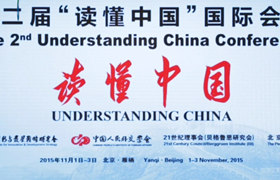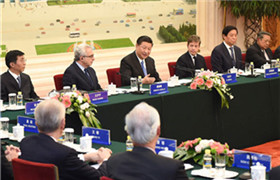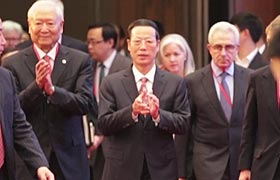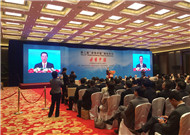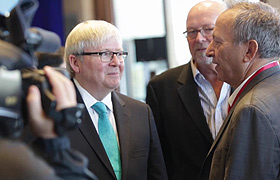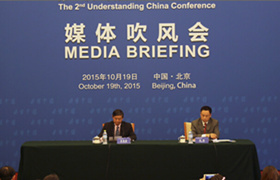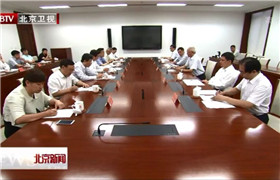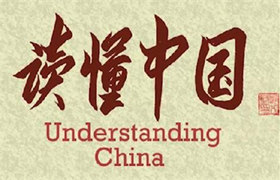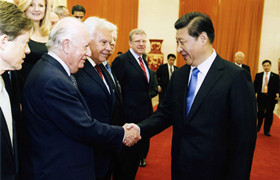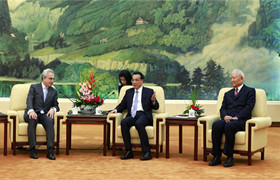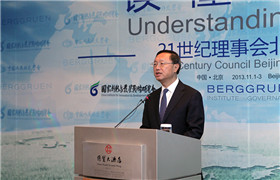- HOME--> News
-
Tell vividly the “Chinese stories” to help the world "understand China"
2015-10-19 Source:www.cyol.com Author:Chen Jing, Yu Runqing (Intern), Tang Tian (Intern)
The YanqiLake International Conference Center based in Beijing will again greet the distinguished guests this autumn, where the 2nd "Understanding China" Conference co-sponsored by CIIDS, CPIFA, Beijing Municipal People's Government and 21st Century Council (Berggruen Institute) will be held on November 1-3. More than 40 former dignitaries, strategists and business leaders from around the world are gathering at the site of sunrise to hear the China story and discuss China’s role and cohesion in the global moments.
"It is a good opportunity for a dialogue between China and the world by opening the door and asking friends to understand China," said Wu Jianmin, CIIDS Executive Vice Chairman and former Chinese ambassador to France, when he was interviewed by the reporter with China Youth Daily on October 19. To understand China is not only the need of China, but also the need of the outside world.
Understanding the Chinese economy and reform from 13th Five-year Plan
As one of the world's important economies, China's economic trend is a hotspot for the time being as well as for the near future. Notably, the forthcoming 13th Five-year Plan has already been put on the table of major research institutions. According to Wu, it is the right time for China to hold the “Understanding China” Conference in early November.
The Fifth Plenary Session of 18th CPC Central Committee will be convened at the end of October to discuss the proposed draft of the 13th Five-year Plan shortlisted on the agenda. The "Understanding China" Conference following the event displays China’s intention to brief the world on its planning; this is the best and most straightforward way to get the world to know China. In the Q&A process, there can be targeted introduction to the world regarding China’s realities and development assertions.
It is reported that at the current session of the Conference, the principals of several Chinese ministries, including the NDRC, MOF, Ministry of Foreign Affairs, Ministry of Science and Technology and Ministry of Supervision, will be on hand to speak, expounding the latest progress and policy of China in various fields for direct exchange with the participants.
In 2014, China's actual outbound investment outsized foreign investment in actual use, making the country a net exporter of capital. According to Wu, this is a turning point, which means that a large number of Chinese enterprises have accelerated their pace in "going global." The government used to play a leading role in attracting foreign investment in China, but businesses have picked up the baton as the country goes global. This shift requires further deepening reform and opening up across China.
Wu says that in this context, how China deepens reform through its 13th Five-year Plan is the world’s top interested question, and the information on reform will be communicated at the conference venue. Wu also believes that some Chinese reform issues, such as the rule of law, will draw great attention. "What China did has Chinese characteristics. How does the Chinese practice differ from that of foreign countries? How will China live up to its commitment to reform? There would be highly desirable questions as well as answers for the outside world at the Conference."
On specific issues, Wu thinks China's economic landscape may be the hotspot of the foreign guests participating in the event. The data released by the National Bureau of Statistics of China on October 19 show China's GDP up by 6.9% year-on-year in Q3, "topping 7%" for the first time in the past 6 years, which raise a sensation among the rest of the world. "There is a worldwide concern of China's economy ending up with a hard landing. Months ago, the Chinese stock market slumped, triggering a tension across the global capital markets, which reflects China's economic implications for the overall world economic recovery." Says Wu Jianmin.
Understanding China’s diplomatic strategy from its path of peaceful development
"China's national defense and foreign policy will also be a hot-debated issue at this session," states Wu, "admittedly, there are some voices from outside doubting the intention of China regarding its national defense and diplomacy strategy. At the meeting, these concerns can be clarified through frank face-to-face exchanges have been, and China’s adherence to the road of peaceful development will be reclaimed."
Wu believes that the current session will further explain the connotation of "peaceful development" to the outside world. In his view, the connotation can be understood from the perspective of the "to-do and not-to-do" list.
Not-to-do: "never seeking hegemony, expansion or alignment." "No hegemony means China will never repeat the mistakes of hegemony competition between the former Soviet Union and the United States. No expansion means China will not follow the suit of past colonial powers in terms of overseas expansion for enclosures. No alignment is a fundamental principle of the Chinese diplomacy, a choice made on the basis of the fundamental interests of the Chinese people and the peoples of the world. If China gets allied with another country, it will set fire to a new Cold War, making the whole world suffer." Wu so concludes.
To-do: "Seeking peace, development and cooperation."
"China's development needs peace. The past three decades are the most peaceful period China has experienced since the outbreak of the Opium War in 1840. A peaceful environment ensures China's achievements so far. Therefore, China will spare no effort to do what is conducive to peace. Today, China still faces many problems and challenges, the resolution to which relying on development. In addition, we must realize that China’s modernization will never be completed behind closed doors, and international cooperation is so essential that the country must be open to the world." Wu so analyzes.
"In my opinion, these are all covered in the connotation of peaceful development. China has been doing so for more than a third of century, and will go along the path in the future." Says Wu Jianmin.
Changing the way of storytelling to make China better understood
In view of the outside world’s misreading of China, Wu Jianmin comments as follows: "China's development has been reshaping international balance of power, where misunderstanding China in the new international landscape is not surprising."
Wu summarizes three causes of these misunderstandings.
"First, the CPC’s leadership and the creativity and enthusiasm of the Chinese people are underestimated. Next, there are ideological prejudices over China. Third, China needs to constantly improve its approach to self-introduction and methodology of self-illustration."
According to him, communication and dialogue is the key to solving the first two problems, while the third can be addressed through ongoing improvement in "telling an amazing China story."
"Why can’t foreigners understand the Chinese talking? This has something to do with the differences in culture and mindset. Chinese people like to talk about principles, as we are accustomed to begin with principles before going into specific cases, which is on the contrary to the reasoning of foreigners." Says Wu.
"Generalization is unacceptable; For multum in parvo, a specific story to introduce China is a good way. So, I prefer more stories about Chinese people to illustrate the principles, especially specific experiences of average people. That would be more effective."
"As China and the West have different histories, cultures and social systems and undergo different stages of development, it is very natural that the two sides have disparities," says Wu, "the disparities should be differentiated, for some can be resolved today but some have to be left for tomorrow and even the day after tomorrow. Those needing longer-term efforts cannot be solved overnight. That’s what we mean by harmony without uniformity. We must insist on dialogue to resolve disputes rather than resorting to arms."
"Throughout history, given all the misreading, misjudgment and improper resolution of disputes, mankind has paid a price too high. Therefore, it is very important to tell an amazing China Story and make the world better understand China by building a platform for dialogue and communication to resolve differences." Says Wu Jianmin.
The younger generations are better China storytellers
Wu also notes that from a broader perspective, if the world really "understands" China, undoubtedly, it will greatly contribute to the prosperity of human society and the progress of human civilization.
"With a population of over 1.3 billion, China is now the top variable in the world's development. China's development is inseparable from the world, and the world cannot afford prosperity and stability without China."
"Moreover, we should see that in the past few centuries, Western civilization has far outperformed Eastern civilization in terms of contribution to the world’s development. But now the situation is different. Seeing the rapid rise of China, India and other developing countries, some sober Westerners start thinking: What kind of cultural force is underlying the rise of countries like China and India? What is the value from Eastern civilization?" Analyzes Wu Jianmin. "Let the world understand China as it converges with the world. The process coincides with that of the Eastern civilization benefiting human beings as China contributes to the world in respect of physical, economic and cultural development. The world absorbs nutrients from the Oriental civilization, nourishing prosperity and progress in human civilization. Moreover, this process is not about one party to conquer the other; it is two different civilizations learning from each other to jointly advance peace, stability and prosperity in the world." Wu so comments. He also notes that China's youth can play a more active role in getting the world to know China.
"A recent US poll shows that American youth aged below 30 have a more favorable impression in China, because young people have less prejudice and get easier access to understanding China via the Internet and other channels." Says Wu. "The world is in contact with young Chinese people, who are also going global. More and more young Chinese are going abroad to study or work, coupled with the increasing number of young foreigners visiting China. Exchange between the youth is much better compared to that in our generation." Wu says that he trusts in the younger generations as better China storytellers to make China understood by the world, given that the young as less biased with more channels available.
-
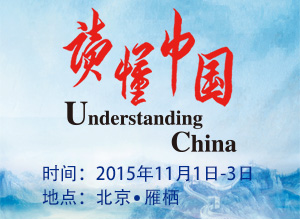
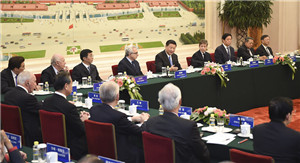 第二届“读懂中国”国际会议
第二届“读懂中国”国际会议2015年11月1-3日,第二届“读懂中国”国际会议在北京雁栖湖国际会议中心召开,国务院副总理张高丽出席了开幕式。
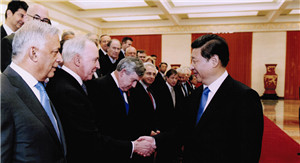 第一届“读懂中国”国际会议
第一届“读懂中国”国际会议会议于2013年11月1-3日在北京召开。会议由中国国家创新与发展战略研究会、中国人民外交学会同贝格鲁恩治理研究会联合主办。
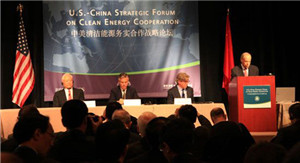 第二届中美清洁能源务实合作战略论坛
第二届中美清洁能源务实合作战略论坛论坛以“未来十年中美关系”为主题,从应对全球性各种挑战和维护世界和平的战略高度认识中美合作的意义。
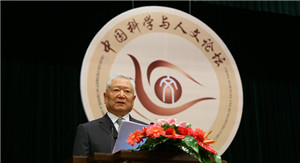 中国科学与人文论坛
中国科学与人文论坛中国科学与人文论坛创办于2003年4月,由著名科学家路甬祥和理论家郑必坚倡导发起,由中科院研究生院和高等教育出版社主办。

